

America's True History of Religious Tolerance. Wading into the controversy surrounding an Islamic center planned for a site near New York City’s Ground Zero memorial this past August, President Obama declared: “This is America.
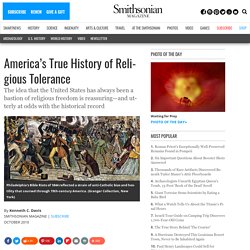
And our commitment to religious freedom must be unshakeable. The principle that people of all faiths are welcome in this country and that they will not be treated differently by their government is essential to who we are.” In doing so, he paid homage to a vision that politicians and preachers have extolled for more than two centuries—that America historically has been a place of religious tolerance. It was a sentiment George Washington voiced shortly after taking the oath of office just a few blocks from Ground Zero. But is it so? In the storybook version most of us learned in school, the Pilgrims came to America aboard the Mayflower in search of religious freedom in 1620. The problem is that this tidy narrative is an American myth. The Spanish had other ideas. Kenneth C. 7 Marks of A Stereotypical American Christian.
1) You Love To Argue, Fight, And Attack There’s nothing quite like flooding people’s Facebook feeds with posts about the sins of gay marriage, abortion, and the Democratic Party or the volleyed claims of bigotry, hypocrisy, and self-interest.
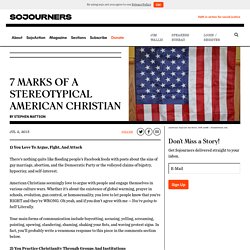
American Christians seemingly love to argue with people and engage themselves in various culture wars. Whether it’s about the existence of global warming, prayer in schools, evolution, gun control, or homosexuality, you love to let people know that you’re RIGHT and they’re WRONG. Oh yeah, and if you don’t agree with me —You’re going to hell!
Literally. Your main forms of communication include boycotting, accusing, yelling, screaming, pointing, spewing, slandering, shaming, shaking your fists, and waving protest signs. 2) You Practice Christianity Through Groups And Institutions. Pew: Sunday Regulars Are Happier and Healthier...... Is America A Christian Nation? Is the United States a "Christian nation"?
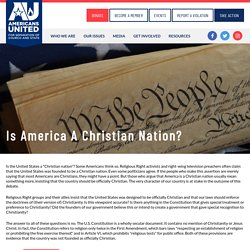
Some Americans think so. Religious Right activists and right-wing television preachers often claim that the United States was founded to be a Christian nation. Even some politicians agree. If the people who make this assertion are merely saying that most Americans are Christians, they might have a point. But those who argue that America is a Christian nation usually mean something more, insisting that the country should be officially Christian. Religious Right groups and their allies insist that the United States was designed to be officially Christian and that our laws should enforce the doctrines of (their version of) Christianity. The answer to all of these questions is no. Congress shall make no law respecting an establishment of religion, or prohibiting the free exercise thereof; — First Amendment to the U.S.
The Founding Fathers did not create a secular government because they disliked religion. What it means to be a Christian in America today. President Donald Trump spoke recently to the Campaign for Life Gala, an annual Washington gathering of activists opposed to abortion.
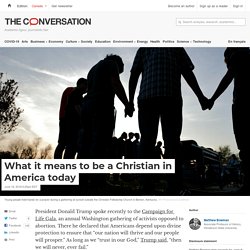
There he declared that Americans depend upon divine protection to ensure that “our nation will thrive and our people will prosper.” As long as we “trust in our God,” Trump said, “then we will never, ever fail.” The speech was recent, but the sentiments were not. Presidents have been uttering similar sentiments for decades. This may seem strange in a nation whose Constitution declares that the government will “make no law respecting an establishment of religion.” America's Christian Tradition Deeply Influences Culture.
You could call it the Christian America paradox: few things have contributed more to the nation’s culture and identity than the broadly shared Christian faith and worldview of its people, yet the very nature of a society that combines religious pluralism (as a matter of both legal right and social norm) with a shared belief in the secular values of the Enlightenment means that the government can do little to support or maintain that heritage.
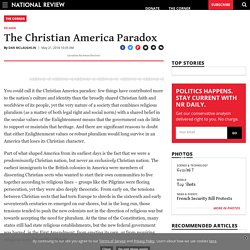
And there are significant reasons to doubt that either Enlightenment values or robust pluralism would long survive in an America that loses its Christian character. In U.S., Decline of Christianity Continues at Rapid Pace. The religious landscape of the United States continues to change at a rapid clip.
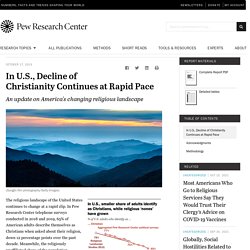
In Pew Research Center telephone surveys conducted in 2018 and 2019, 65% of American adults describe themselves as Christians when asked about their religion, down 12 percentage points over the past decade. Meanwhile, the religiously unaffiliated share of the population, consisting of people who describe their religious identity as atheist, agnostic or “nothing in particular,” now stands at 26%, up from 17% in 2009. Both Protestantism and Catholicism are experiencing losses of population share.
Currently, 43% of U.S. adults identify with Protestantism, down from 51% in 2009. And one-in-five adults (20%) are Catholic, down from 23% in 2009. These are among the key findings of a new analysis of trends in the religious composition and churchgoing habits of the American public, based on recent Pew Research Center random-digit-dial (RDD) political polling on the telephone.